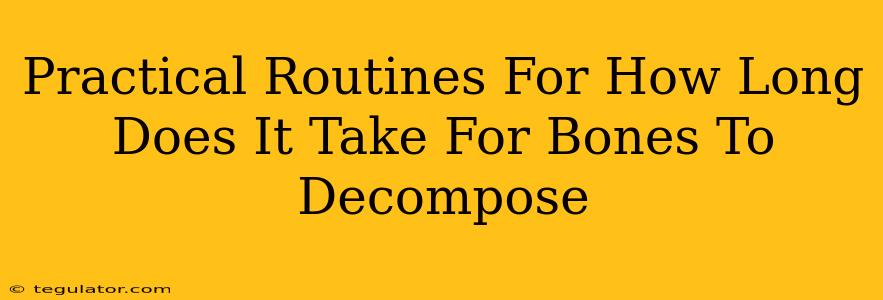The decomposition of bones, a fascinating and often morbid topic, is a process influenced by a surprising number of factors. There's no single answer to "how long does it take for bones to decompose?" Instead, let's delve into the practical realities that dictate this timeline. Understanding these factors can help you appreciate the complexities of the natural process and even contribute to forensic science knowledge.
Factors Affecting Bone Decomposition Time
Several key elements influence how quickly bones break down after death. These include:
1. Environmental Conditions:
- Temperature: Higher temperatures accelerate decomposition. Heat speeds up the activity of microorganisms and scavengers, hastening bone breakdown. Conversely, extremely cold temperatures can significantly slow or even halt the process, resulting in remarkably well-preserved remains.
- Humidity: Moist environments generally foster faster decomposition. Bacteria thrive in damp conditions, contributing to the breakdown of organic matter surrounding and within the bones themselves. Dry environments, conversely, inhibit microbial activity.
- Soil Composition: The type of soil significantly impacts the decomposition rate. Acidic soils can accelerate the process, while alkaline soils can slow it down. The presence of certain minerals can also affect bone preservation.
- Access to Scavengers: Animals like insects, rodents, and larger predators play a crucial role. They consume soft tissues, accelerating the exposure of the skeletal remains to the elements. The absence of scavengers can significantly slow the rate of bone decomposition.
2. Individual Factors:
- Body Size and Composition: Larger individuals generally decompose slower due to their greater mass. Body composition, particularly the presence of fat, can also influence the rate of decomposition.
- Cause of Death: Trauma, disease, and other factors affecting the body can impact decomposition rates. Certain illnesses and injuries might accelerate or decelerate the process.
3. Burial Practices:
- Burial Depth: Shallow burial increases the exposure to environmental factors, speeding up decomposition. Deeper burial can limit oxygen access and slow the process.
- Burial Environment: The type of soil and surrounding environment significantly affects the rate of decomposition as discussed above. Whether it's a dry desert or a bog, the environment plays a critical role.
- Presence of a Coffin: Coffins can provide some protection against scavengers and environmental elements, slowing down the process, at least initially. However, over time, the coffin itself will degrade.
Estimating Decomposition Time: A Complex Puzzle
Given these variables, assigning a precise timeline for bone decomposition is nearly impossible. In ideal conditions (warm, moist, with access to scavengers), significant decomposition might occur within months. In less ideal conditions (cold, dry, limited access to scavengers), skeletal remains can persist for many years, even centuries.
Forensic anthropologists use a variety of techniques to estimate the time since death, including examining the state of bone preservation, the presence of any remaining soft tissue, and the surrounding environmental conditions. This is a complex process requiring extensive expertise and careful analysis.
Practical Applications of Understanding Bone Decomposition
Knowledge of bone decomposition is crucial in several fields:
- Forensic Science: Determining the time since death is essential in criminal investigations. Understanding the factors influencing bone decomposition is vital in piecing together the timeline of events.
- Archaeology: The study of bone decomposition helps archaeologists understand burial practices and the environmental conditions of past civilizations. The preservation of bones provides valuable insights into ancient societies.
- Paleontology: Understanding how bones decompose helps paleontologists interpret the fossil record and understand the conditions that led to fossil formation.
By understanding the intricate interplay of these factors, we can gain a more complete picture of the fascinating process of bone decomposition. It's a process far from simple, highlighting the power of nature and the complexity of its processes.

